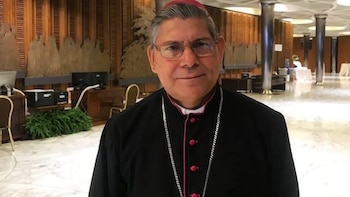
(ATR) Organizers for the 2019 Rugby World Cup say they want to prepare a tournament aimed at bringing "rugby for tomorrow".
Japan won the right to host rugby’s flagship event in 2009, and is barreling toward the one year to go threshold this September. Japan 2019 Chief Executive Akira Shimazu told Around the Rings so far costs have been managed, infrastructure is built, but most importantly demand for tickets is sky high.
"There is a big presence that we see and just for the priority sales we received 2.5 million ticket applications," Shimazu said in a one-on-one interview. "According to World Rugby officials the priority sales status is very good compared to past tournaments which means that preparations towards the next year’s Rugby World Cup is well evaluated and well received by the fans."
A total of 1.8 million tickets are expected to be sold for the 2019 World Cup for 48 games in 12 sites across Japan. So far, requests have been made for tickets from more than 101 countries around the world.
Japanese organizers are emphasizing filling stadiums around the country rather than trying to break any attendance records set during the 2015 World Cup in England. That World Cup had nearly 2.5 million spectators. Shimazu said that England marketed its World Cup as the "home of rugby," while Japan aims to stage a World Cup with the theme "rugby for tomorrow".
The tournament’s opening game will take place in Ajinomoto Stadium in western Tokyo, while the final will be held at Yokohama Stadium. Holding the final in Yokohama was the original plan for the 2019 Rugby World Cup but it was moved to the planned Olympic Stadium after Tokyo won the right to host the 2020 Olympics. When the initial plans for the Olympic Stadium fell apart and its construction deadline was pushed back, organizers were forced to go back to Yokohama.
"Of course we do regret that, but to [borrow a Japanese phrase] ‘we changed the difficulties into an opportunity,’" Shimazu said. "[To have] the opening Game and the final take place in a different stadium, it is a very unique attempt for the RWC...and the plan is made so that it would really guide the 2019 Rugby World Cup into a successful result."
Only three stadiums for the tournament required renovations or to be built, Shimazu said. The sites were deliberately chosen to highlight the diversity of different regions in Japan, including Iwate prefecture, which was hit by the 2011 earthquake and tsunami. The stadium in Kamaishi is the only one being built for the World Cup and is scheduled to be completed next month.
"We would like to have a tour made in Japan [for spectators] to go to different areas and not just Tokyo and Yokohama," Shimazu said. "The season is very good September through November, the Japanese autumn season, so it is the best season [to visit]."
Organizers and the Japan Football Rugby Union believe hosting the tournament will help grow rugby participation numbers in Japan. Currently Japan has only around 100,000 players according to Shimazu, a number the JFRU wants to double.
Japan had its best finish ever at a Rugby World Cup in 2015, when it started the tournament with a shock victory over perennial powerhouse South Africa. It was the country’s first Rugby World Cup win since 1991 and only its second ever victory in the tournament.
In rugby’s other discipline, sevens, Japan qualified for the first time as a core team for the men's 2018-19 Sevens Series after finishing fourth at the 2016 Olympics. After the Rugby World Cup, the men's and women's sevens teams will feature at the Tokyo 2020 Olympics, the second straight major event in Japan. Shimazu says holding both events back to back presents an opportunity for organizers to "collaborate with each other".
"Well we are not thinking the Olympics are a competitor," Shimazu said. "So looking at the development of rugby in Japan or in Asia, sevens could be a weapon...and it is right now one of the categories in the Olympics.
"So in Japan two major rugby events will take place. The two [tournaments] coming together would be a positive event that we want to achieve."
Written and reported by Aaron Bauer in Tokyo
For general comments or questions, click here .
25 Years at # 1: Your best source for news about the Olympics is AroundTheRings.com , for subscribers only.
Últimas Noticias
Sinner-Alcaraz, the duel that came to succeed the three phenomenons
Table tennis: Brazil’s Bruna Costa Alexandre will be Olympic and Paralympic in Paris 2024

Rugby 7s: the best player of 2023 would only play the medal match in Paris

Rhonex Kipruto, owner of the world record for the 10000 meters on the road, was suspended for six years

Katie Ledecky spoke about doping Chinese swimmers: “It’s difficult to go to Paris knowing that we’re going to compete with some of these athletes”




